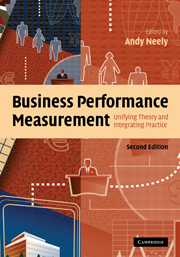Book contents
- Frontmatter
- Contents
- List of figures
- List of tables
- List of boxes
- List of contributors
- Introduction
- Part I Performance measurement – functional analyses and theoretical foundations
- Part II Performance measurement – frameworks and methodologies
- Part III Performance measurement – practicalities and challenges
- Part IV Performance measurement in public services
- Part V Performance measurement – emerging issues and enduring questions
- Index
Part II - Performance measurement – frameworks and methodologies
Published online by Cambridge University Press: 22 September 2009
- Frontmatter
- Contents
- List of figures
- List of tables
- List of boxes
- List of contributors
- Introduction
- Part I Performance measurement – functional analyses and theoretical foundations
- Part II Performance measurement – frameworks and methodologies
- Part III Performance measurement – practicalities and challenges
- Part IV Performance measurement in public services
- Part V Performance measurement – emerging issues and enduring questions
- Index
Summary
The second part of the book explores some of the frameworks and methodologies associated with performance measurement. While there is considerable interest in the balanced scorecard, there are, of course, numerous other measurement frameworks and methodologies, each with their own strengths and weaknesses.
The first contribution in this part, from Andy Neely, Mike Kennerley and Chris Adams, reviews some of these other measurement frameworks and then proposes an alternative framework: the performance prism. Neely, Kennerley and Adams argue that the strength of the performance prism lies in the fact that it unifies existing measurement frameworks and builds upon their individual strengths. The balanced scorecard, for example, is strong in that it argues for a balanced set of measures, but weak in that it omits some extremely important stakeholder perspectives – i.e. those of employees and suppliers. Similarly, activity-based costing is strong in that it explicitly recognizes the importance of activities and processes, but weak in that it does not link these processes back to strategies or stakeholders. The performance prism addresses these, and other issues, by providing an integrated framework with which to view organizational performance.
The second contribution explores the concepts of “beyond budgeting” and the adaptive organization. In recent years there has been significant interest in beyond budgeting, a notion promulgated by Jeremy Hope and Robin Fraser.
Information
- Type
- Chapter
- Information
- Business Performance MeasurementUnifying Theory and Integrating Practice, pp. 141 - 142Publisher: Cambridge University PressPrint publication year: 2007
